COPE China Seminar at the ISMTE 2017 Asian-Pacific Conference
Report from Trevor Lane and Helena Wang, COPE Council
If the world’s published research were a building in progress, then its structural integrity would balance on the three ethical pillars of research publishing—honest authorship (both attribution and behaviour), sound peer review, and prevention of plagiarism. These were the three themes of the first COPE China Seminar, which was held at the Kempinski Hotel Beijing Lufthansa Center on Sunday, 26 March 2017, in conjunction with the 2017 ISMTE Asian-Pacific Conference.
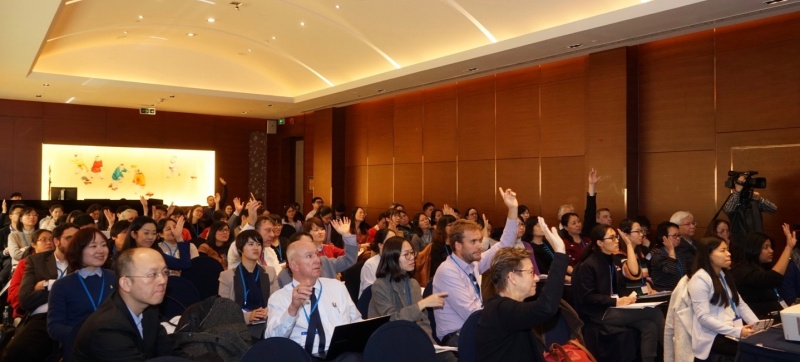 Titled “The Pillars of Publication Ethics”, the one-day event was attended by more than 120 delegates working in research, education, publishing and related services. Chris Graf, COPE Co-Vice Chair, opened the seminar by introducing COPE and its free website resources including Chinese translations. He urged the audience to “spread the word” and work together, and with COPE, to maintain the integrity of the world’s research record.
Titled “The Pillars of Publication Ethics”, the one-day event was attended by more than 120 delegates working in research, education, publishing and related services. Chris Graf, COPE Co-Vice Chair, opened the seminar by introducing COPE and its free website resources including Chinese translations. He urged the audience to “spread the word” and work together, and with COPE, to maintain the integrity of the world’s research record.
COPE Treasurer Deborah Poff and Council Member Helena Wang chaired the session on authorship. Siu-wai Leung (University of Macau, China) spoke on how the responsibility to clearly define authorship is shared by journals, editors, research institutions, national bodies, and editorial services. Mark Israel (Australasian Human Research Ethics Consultancy Services) called for putting authorship guidelines into practice and gave some practical recommendations for journals.
The session on peer review, chaired by Chris Graf and COPE Council Member Jason Hu, began with a presentation by COPE Trustee and COPE Treasurer, Deborah Poff. Citing the value of peer review in knowledge creation, she encouraged recognition of peer review as an academic activity and advocated rewarding peer reviewers. Yongmao Jiang (Publishing Group of the Chinese Medical Association) explained how his group’s journals emphasize integrity and ethics to peer reviewers, and how one journal is using a panel of editors to make final manuscript decisions.
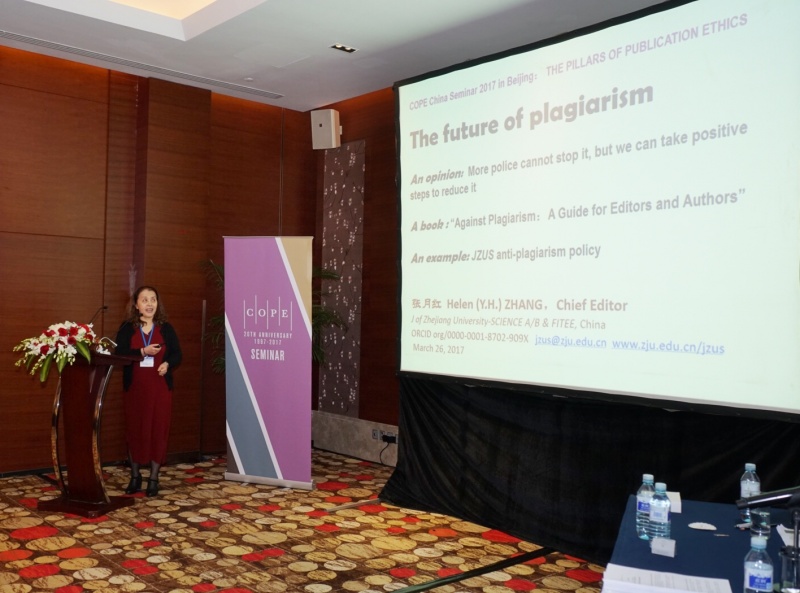 Chaired by Helena Wang and Jason Hu, the final session was about tackling plagiarism. Helen Zhang (Journal of Zhejiang University-SCIENCE A/B & FITEE) categorized plagiarism and its countermeasures into nine types, and Tracey Bretag (International Journal for Educational Integrity and University of South Australia) pointed out that both the extent and intent of plagiarism need to be considered when deciding a response.
Chaired by Helena Wang and Jason Hu, the final session was about tackling plagiarism. Helen Zhang (Journal of Zhejiang University-SCIENCE A/B & FITEE) categorized plagiarism and its countermeasures into nine types, and Tracey Bretag (International Journal for Educational Integrity and University of South Australia) pointed out that both the extent and intent of plagiarism need to be considered when deciding a response.
A copy of all of the presentations can be found on the COPE website.
Each session ended with lively Q&A participation from both local and international delegates. Audience engagement was also high in the interactive cases workshop that was chaired by Chris Graf and COPE Council Member Trevor Lane. Based on real authorship, peer review, and plagiarism cases discussed at COPE Forum and archived on the COPE website, the six case studies involved audience polls, debate on corrective and preventive actions, and a look at relevant COPE resources and decision-making guidelines.
Read cases with advice
Our inaugural COPE China Seminar was a great success and received positive and encouraging audience feedback. Special thanks go to Linda Gough, COPE Administrator, for the seminar’s smooth running, preparation and organisation, and to Jason Hu for onsite photography and setting up social media accounts. Above all, this event provided a good model for future seminars in China, where we hope to continue spreading the word about COPE and best practices in research publishing.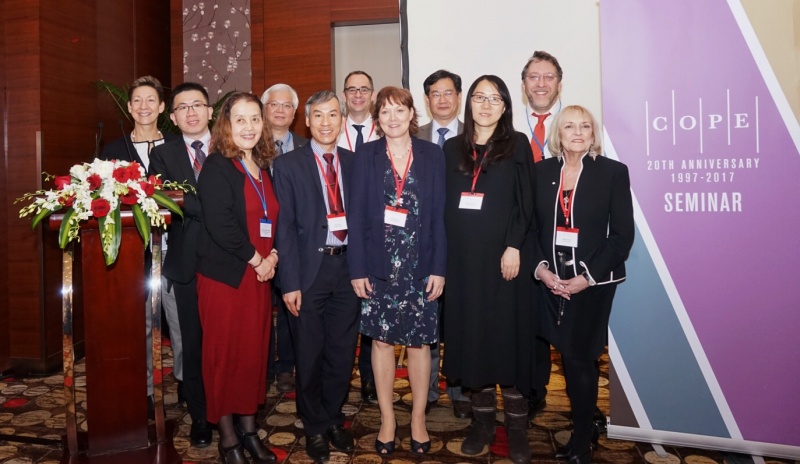
 Case #16-19
Case #16-19
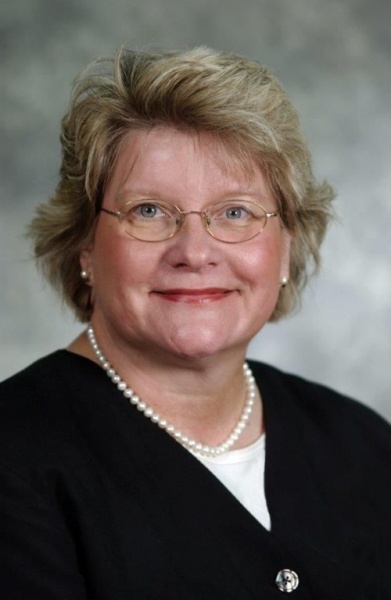 COPE is in the midst of a busy time. Trustees and Council members are broadly placed across the globe, and all are dealing with publication ethics issues in their various roles. COPE continues to grow and expand in its mission to support editors and publishers as they deal with publication ethics issues, misconduct and education. We urge you to review the
COPE is in the midst of a busy time. Trustees and Council members are broadly placed across the globe, and all are dealing with publication ethics issues in their various roles. COPE continues to grow and expand in its mission to support editors and publishers as they deal with publication ethics issues, misconduct and education. We urge you to review the  Mixing politics and journal publications
Mixing politics and journal publications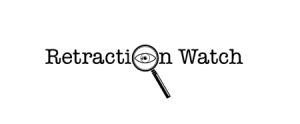 NAS recommends independent board to address detrimental research practices
NAS recommends independent board to address detrimental research practices Social science profession ethics
Social science profession ethics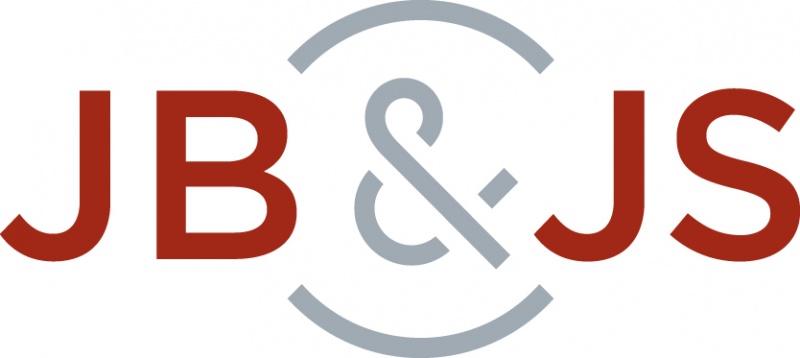 Conflicts of interest?
Conflicts of interest? You should know if you're buying a lemon...
You should know if you're buying a lemon... Ethical problems with citations
Ethical problems with citations Gender bias in peer reviewing?
Gender bias in peer reviewing? Report on "Fake Research"
Report on "Fake Research"  RRI - what is it and is it political?
RRI - what is it and is it political? A proposal to promote data sharing
A proposal to promote data sharing Preprints encouraged by NIH
Preprints encouraged by NIH Open research platform to speed dissemination of Bill and Melinda Gates Foundation funded research
Open research platform to speed dissemination of Bill and Melinda Gates Foundation funded research Self plagiarism in health sciences research: a way forward?
Self plagiarism in health sciences research: a way forward? Learning by doing
Learning by doing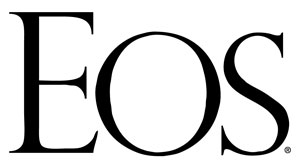 Open to comments: American Geophysical Union task force on scientific ethics
Open to comments: American Geophysical Union task force on scientific ethics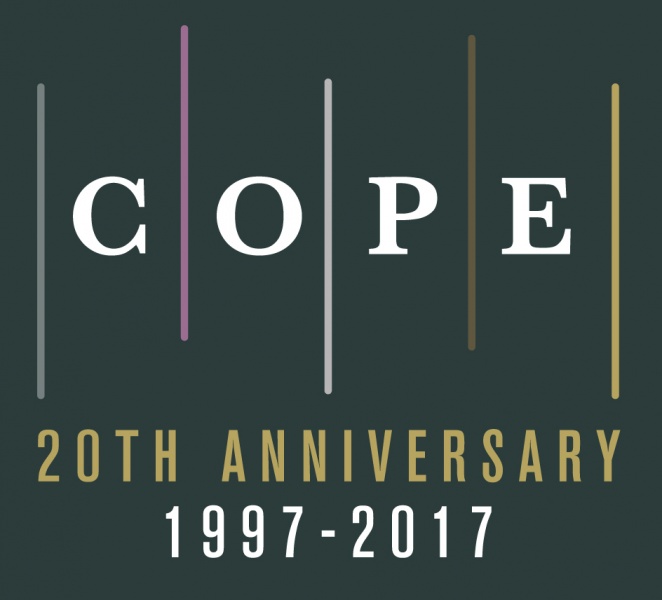 Join us to celebrate 20 years of COPE at our 2017 European Seminar, with a special programme reflecting on changing times in publication ethics.
Join us to celebrate 20 years of COPE at our 2017 European Seminar, with a special programme reflecting on changing times in publication ethics. Titled “The Pillars of Publication Ethics”, the one-day event was attended by more than 120 delegates working in research, education, publishing and related services.
Titled “The Pillars of Publication Ethics”, the one-day event was attended by more than 120 delegates working in research, education, publishing and related services.  Chaired by Helena Wang and Jason Hu, the final session was about tackling plagiarism. Helen Zhang (Journal of Zhejiang University-SCIENCE A/B & FITEE) categorized plagiarism and its countermeasures into nine types, and Tracey Bretag (International Journal for Educational Integrity and University of South Australia) pointed out that both the extent and intent of plagiarism need to be considered when deciding a response.
Chaired by Helena Wang and Jason Hu, the final session was about tackling plagiarism. Helen Zhang (Journal of Zhejiang University-SCIENCE A/B & FITEE) categorized plagiarism and its countermeasures into nine types, and Tracey Bretag (International Journal for Educational Integrity and University of South Australia) pointed out that both the extent and intent of plagiarism need to be considered when deciding a response.
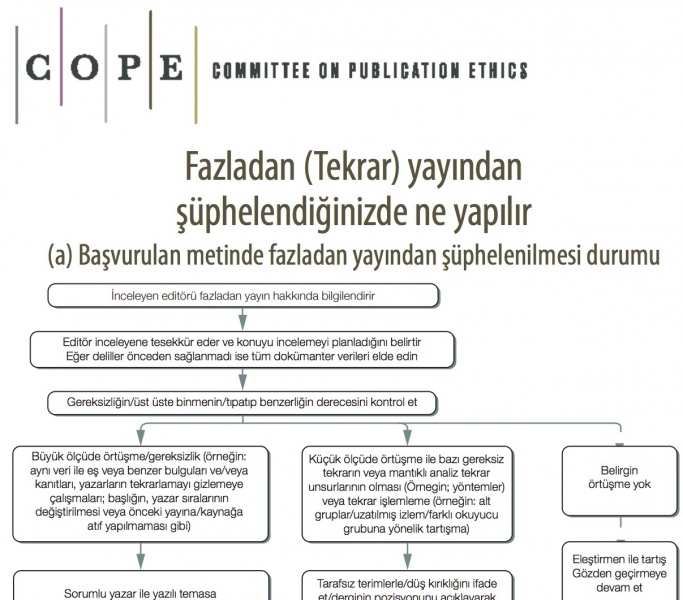 Now translated into Turkish, the COPE flowcharts help editors implement advice in suspected misconduct cases. Our thanks to Professor Dr F Suna Kıraç and Professor Dr Bilgin Timuralp for their translation work. The Turkish flowcharts can be downloaded from the
Now translated into Turkish, the COPE flowcharts help editors implement advice in suspected misconduct cases. Our thanks to Professor Dr F Suna Kıraç and Professor Dr Bilgin Timuralp for their translation work. The Turkish flowcharts can be downloaded from the